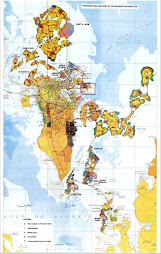Wednesday, October 24, 2007
The Internet as a global village for Arab Activists
http://www.mideastyouth.com/2007/10/23/the-internet-as-a-global-village-for-arab-activists/
Author: Esra'a (Bahrain) - October 23, 2007
(The article below is cross-posted from the Arab Press Network.)
Social networking is becoming increasingly popular amongst young people in the Middle East who wish to interact and inspire change in the region. For many years, our only form of mass communication was via traditional media outlets, most of which were heavily moderated or state owned. Young people had no shared platform where they could collectively exchange information about subjects ranging from literature, art and music to reporting human rights violations, the latter of which is becoming more common.
With this in mind, social networking sites along with the regional blogosphere have introduced a new form of mass communication amongst the young. Many people have started to use these services productively and frequently to communicate and network with each other to achieve common goals. This level of interactive journalism has proven to be so influential in certain countries of the region where censorship is more rampant - as is the case in Egypt and Iran - that the governments have began to monitor, harass, and occasionally arrest activist bloggers. This is mostly due to the fact that blogging plays a role in organising social movements, attracting thousands of young activists whose efforts are eventually covered by prominent international news media, jeopardizing the foreign relations and worldwide reputation of the said countries. It also gives a louder voice to minorities who are usually oppressed and who face extreme censorship in mainstream media outlets. Victims of such oppression include Kurdish activists, Baha’is and homosexuals, amongst others.
In the past, traditional media outlets offered a transmissional model of communication, where messages were simply sent and received with little to no interaction from the public. As previously stated, many of these media outlets were directly run by governments, making them products for state-sponsored propaganda. The internet has completely changed this, by performing as a model where entire communities can get involved, building lasting connections with like-minded individuals and organizing new campaigns or empowering existing ones. Traditional media outlets such as newspapers, television, and radio rarely offer this opportunity. Independent publications are very difficult to finance, radio and television channels are still impossible to initiate by average young people, and it has not been common for activists to get involved in the mainstream media. The internet on the other hand is increasingly becoming more common in households and university campuses, which makes it possible for independent activists or writers to reach a much wider audience. A popular local blog is almost as influential today as a popular newspaper, and in addition to that, it has a better potential of receiving attention from foreign news media.
Although blogging is incredibly effective when it comes to grassroots activism, it is not the only thing it is being used for. Promoting cultures is another positive aspect of blogging and social networking in general, making it an educational experience as opposed to a mere political one. For example, bloggers in the Gulf can finally exchange information with bloggers in North Africa. We can see how many of them live and how they feel about the governments and social issues in their countries. We cannot successfully be exposed to local youth cultures, socio-political issues, and minorities from these various countries if we solely rely on cable television or newspapers.
Aside from building and empowering regional relations, tech-oriented media can also bring young people from different sides of the planet together, further revolutionizing the experience. For example, a group of students in Bahrain are currently working on a social networking platform that will be used to specifically serve as a cultural exchange between Arab and Japanese youth. This is being done to promote tourism, economic and diplomatic relations, as well as empowering each other’s cultures by teaching each other about our values, beliefs, and history. Another example is the way in which Arab and Chinese activists are using the internet to empower each other’s efforts for human rights. The New Youth 4 campaign was developed with the help of Arab activists to secure the release of four Chinese cyber dissidents. In return, Chinese activists are promoting the Free Kareem campaign, aimed to free the young Egyptian blogger Kareem Amer. This kind of relations were extremely rare before the internet. It shows how the internet serves as a primary platform for the “global village,” a term used to describe how technology-mediated communication allows people to interact and network with each other on a global scale.
By now, it is well-known that the internet has developed a new communication strategy that transcends all forms of traditional media outlets. The more people have access to the internet in the Arab region, the more power and influence it will eventually have, making it much easier for young activists to achieve real change in their region.







